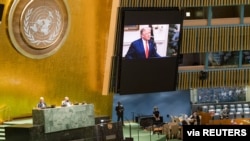U.S. President Donald Trump called on the United Nations to “hold China accountable for their actions” in a speech to the world body’s General Assembly Tuesday.
In a prerecorded speech from the White House, Trump blamed the Chinese government for the global spread of COVID-19, the disease caused by the coronavirus, which has now infected 31 million people worldwide and killed more than 965,000.
“In the earliest days of the virus, China locked down travel domestically, while allowing flights to leave China and infect the world,” the U.S. president said in his address. “The Chinese government, and the World Health Organization, which is virtually controlled by China, falsely declared that there was no evidence of human-to-human transmission.”
China and WHO, to which the president has cut funding from the United States, “falsely said people without symptoms would not spread the disease,” Trump said.
China criticism
Trump’s speech was “unusually critical of China for a United Nations General Assembly speech by a U.S. president,” Julian Ku, a professor of law at Hofstra University, said. “By naming China as responsible for the spread of the virus and calling it the ‘China virus,’ President Trump is seeking global support to hold China responsible.”
Ku said while he is skeptical Trump’s remarks will persuade anyone at the U.N. to take any measures, “it might increase the global pressure on China to cooperate more fully with international investigations of the origins of the pandemic and its spread.”
Quincy Institute Fellow Max Abrahms said the pandemic, in theory, could have fostered international cooperation to try to mitigate the mutual threat.
“Trump, though, is playing the nationalism card, blaming China for spreading this virus. This type of argument will play well with xenophobes who love this president,” said Abrahms, also an associate professor of political science and public policy at Northeastern University.
“What China did was inexcusable,” replied White House Press Secretary Kayleigh McEnany during Tuesday’s press briefing, when asked about the president’s tough posture towards Beijing in his address. “There’s no bigger bully than China when it comes to COVID.”
In his recorded UNGA remarks from Beijing, Chinese President Xi Jinping said any attempt to politicize the pandemic should be rejected, and WHO should be given a leading role in the international response to the coronavirus.
Pandemic response
Leaders avoided traveling to New York for what was to be a high-profile celebration of the General Assembly’s 75th session due to the pandemic.
No country has been hit harder by the coronavirus than the United States, with more than 200,000 deaths and 6.9 million reported infections, according to the Johns Hopkins University Coronavirus Resource Center.
Trump has been harshly criticized for his handling of the pandemic, including from some former officials of his own administration.
But the president has defended the U.S. response, calling it “the most aggressive mobilization since the Second World War.”
Trump on Tuesday told the U.N. General Assembly the United States “will distribute a vaccine. We will defeat the virus. We will end the pandemic. And we will enter a new era of unprecedented prosperity, cooperation and peace.”
US as ‘peacemaker’
His speech also included references to the recent U.S. brokering of economic cooperation between Serbia and Kosovo, and the deals his administration helped negotiate to normalize Israeli relations with Bahrain and the United Arab Emirates.
Trump also discussed efforts to wind down the war in Afghanistan, where U.S. forces have been deployed since 2001. Plans are in place to reduce the troop level there to 4,500 by November.
“As we speak, the United States is also working to end the war in Afghanistan, and we are bringing our troops home. America is fulfilling our destiny as peacemaker,” Trump said.
Another topic raised by Trump was Iran. The United States, in defiance of other U.N. Security Council members, declared it reimposed sanctions against Iran related to the 2015 international agreement on the country’s nuclear program.
Other signatories of the Iran nuclear deal have dismissed the U.S. action, arguing that since the Trump administration withdrew from the pact in 2018, it does not have the standing to utilize the snapback sanctions mechanism the Security Council approved.
Promoting US interests
More broadly, Trump’s address also included the promotion of his preference to prioritize U.S. interests over multilateral efforts, a theme he has stressed in previous annual addresses to the international organization.
“For decades, the same tired voices proposed the same failed solutions, pursuing global ambitions at the expense of their own people. But only when you take care of your own citizens, will you find a true basis for cooperation,” he concluded.
Trump’s speech “reflected the fact that we're just a little over 40 days away from a U.S. election, said Jon Alterman, who holds the chair in global security and geo-strategy at the Center for Strategic & International Studies. “And as I listened to the speech, it felt to me like some lines were almost scripted for campaign ads.”
(Patsy Widakuswara in Washington, Margaret Besheer at the United Nations contributed to this story.)









